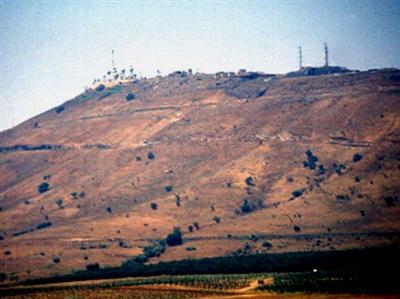Israeli Prime Minister Binyamin Netanyahu’s chief of the National Security Council Dr. Uzi Arad recently reiterated the Likud Party's hard line position on the status of the Golan Heights. Arad was unambiguous in his choice of words – Israel will not return the entire plateau to Syria, even in return for a peace agreement. Many Israelis have relocated to the Golan – they will have to be compensated for the loss of their property and livelihood. Less likely is a deal whereby they could retain their property in some sort of special zone after the return of the area to Syria. Also, unless Israel can reach some sort of “special zone” agreement with Syria, they will lose their huge intelligence collection facility (photo) on Har Avital (or Tal Abu Nada, as the Syrians call it). This is a key facility and is the primary early warning system against a Syrian attack on the Golan. Most importantly, if and when Israel returns the Golan to Syria, it will lose control of the headwaters of the Jordan River, a key source of water for Israeli agriculture in the Jordan Valley. Syria would have to agree not to divert the waters away from its current course.
This stance effectively eliminates the possibility of progress on the Israel-Syria track of the Middle East peace process. Syria will accept nothing less than the return of the entire Golan – it is after all Syrian territory. Israel’s refusal to consider that demand leaves no room for Syrian President Bashar al-Asad to maneuver. Should he countenance a deal with Tel Aviv without a guarantee of regaining the lost territory, it is doubtful he would remain in power for long.
The effects of the Israeli coalition’s intransigence go beyond Syria and Israel – it also severely impacts American policy in the region. The Obama administration is attempting to improve American relations with Syria, including returning an ambassador to the U.S. Embassy in Damascus. No doubt the President hopes that better relations between Washington and Damascus will provide the opportunity to restart the stagnant Israel-Syria track. Given Arad’s recent statements, progress will be next to impossible.
The Israelis are not looking at the big picture.
Making peace with Syria has little downside while offering tremendous upside potential. Granted, the peace with Syria means eventual withdrawal from the Golan Heights. Israel has spent millions of dollars on agricultural infrastructure – produce and wine from the area is highly regarded in Israel.


To be sure, all these factors mitigate against returning the Golan to its rightful owners. However, there is tremendous potential if the Israelis agree to do just that. The return does not have to be immediate – it can be structured like the Israeli withdrawal from Sinai. International observers could monitor the process – the modalities are not as important as the commitment to do it.
What could Israel hope to gain by such a commitment? Obviously, the Israelis are not going to relinquish control of the headwaters of a primary water source, blind their early warning system, and remove valuable agricultural infrastructure without something significant in return.
Israel will demand that Syria cease its support for Hizballah. It will also demand that Syria stop allowing Iran to use Syrian airspace and territory for Iranian support of its Lebanese surrogates. This would be a major policy success – virtually all of Hizballah’s weapons, funding and training are provided by Iran and Syria. Cutting off this support would cripple one of Israel’s fiercest enemies.
Iran is the key player here. Israel must marginalize Iranian aspirations to be the dominant power broker in the region. Reaching an agreement with Syria would impact Tehran’s ability to influence events in the Levant and possibly lessen their support for Hamas and other Palestinian groups. That is a laudable strategic goal.
As long as the Likud Party insists that Israel will not return the Golan Heights to Syria, there will be no peace in the Middle East.
It’s that simple.

.jpg)
